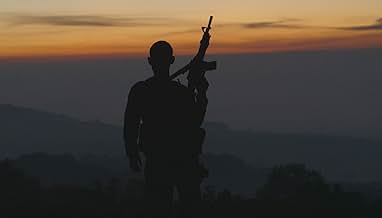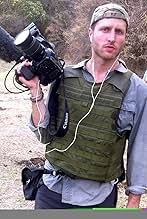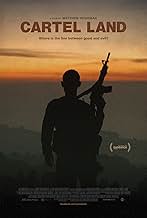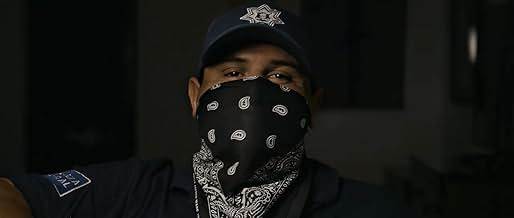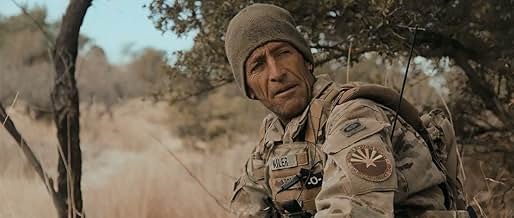IMDb-BEWERTUNG
7,3/10
19.036
IHRE BEWERTUNG
Füge eine Handlung in deiner Sprache hinzuFilmmaker Matthew Heineman examines the state of the ongoing drug problem along the U.S.-Mexican border.Filmmaker Matthew Heineman examines the state of the ongoing drug problem along the U.S.-Mexican border.Filmmaker Matthew Heineman examines the state of the ongoing drug problem along the U.S.-Mexican border.
- Für 1 Oscar nominiert
- 19 Gewinne & 38 Nominierungen insgesamt
Nicolás Sierra
- Self
- (as as Nicolás Sierra 'El Gordo')
Alfredo Castillo Cervantes
- Self - Mexican political
- (as Alfredo Castillo)
María Imilse Arrué
- Self
- (as María Imilse)
Empfohlene Bewertungen
Editors note:
Almost always people comment on films on this website in quite a good way. So I never felt the urge to write/contribute something....
The film:
First of all I never wrote a review on this website before. And to be honest i don't think this will count as a review. Actually it was never my intention to write a review but more so to ask a critical question... Is this still a documentary? The quality of the images, the story and of the film in general are mind blowing! It gets you thinking and shows you the good, the bad and the ugly (pun intended).The story itself and the people involved are real, but in my opinion this is a reenactment! Staged, beautifully done but staged... The subject and the way they showed it is compelling, brutal at times, and it will get you thinking but I can't lose the feeling i watched a movie/film and not a documentary... Which is either brilliant or bad... Help me out, your thoughts pls.
Almost always people comment on films on this website in quite a good way. So I never felt the urge to write/contribute something....
The film:
First of all I never wrote a review on this website before. And to be honest i don't think this will count as a review. Actually it was never my intention to write a review but more so to ask a critical question... Is this still a documentary? The quality of the images, the story and of the film in general are mind blowing! It gets you thinking and shows you the good, the bad and the ugly (pun intended).The story itself and the people involved are real, but in my opinion this is a reenactment! Staged, beautifully done but staged... The subject and the way they showed it is compelling, brutal at times, and it will get you thinking but I can't lose the feeling i watched a movie/film and not a documentary... Which is either brilliant or bad... Help me out, your thoughts pls.
Greetings again from the darkness - from the Dallas International Film Festival. Even in this digital age where information exists from all sides of a conflict
often with corresponding video, the general public somehow remains complacent to issues that don't directly and obviously affect their lifestyle. Skilled documentarian Matthew Heineman ignores the rhetoric of political speeches and plops the war against drug cartels right into our lap.
This is a different approach to a topic with which we are all at least somewhat familiar. The involved parties include the affected communities (in Mexico and Arizona), the governments and affiliated agencies (DEA, Border Patrol), the ever-expanding vigilante groups of citizens (Arizona Border Recon, AutoDefensas), and of course the cartels (focus on Knights Templar).
Intimacy is the key here, as Mr. Heineman takes us inside these groups with an up-close look at leaders. Especially fascinating is Dr. Mireles who is the face of the AutoDefensas – a group he pledges will protect communities from the cartels, who clearly have no regard for human life. The film doesn't shy away from the expected issues: citizen pushback, greed, abuse of power, and corruption. As AutoDefensas teams with the Mexican government to create the Rural Defense Force, we can't help but wonder if the rumors of differing goals are at play in the drug battles. Citizens want safety, but what is it that the government wants? Is the goal drug-free streets or is it a cut of the action.
Learning how desperate the vigilantes are to protect their homes, turf and way of life, we are left with little doubt of their mission. It's everyone else that we must keep questioning and holding accountable. This is not an easy documentary to watch, but it's necessary if you have previously lost interest as the next politician proclaims he will continue "the war on drugs".
This is a different approach to a topic with which we are all at least somewhat familiar. The involved parties include the affected communities (in Mexico and Arizona), the governments and affiliated agencies (DEA, Border Patrol), the ever-expanding vigilante groups of citizens (Arizona Border Recon, AutoDefensas), and of course the cartels (focus on Knights Templar).
Intimacy is the key here, as Mr. Heineman takes us inside these groups with an up-close look at leaders. Especially fascinating is Dr. Mireles who is the face of the AutoDefensas – a group he pledges will protect communities from the cartels, who clearly have no regard for human life. The film doesn't shy away from the expected issues: citizen pushback, greed, abuse of power, and corruption. As AutoDefensas teams with the Mexican government to create the Rural Defense Force, we can't help but wonder if the rumors of differing goals are at play in the drug battles. Citizens want safety, but what is it that the government wants? Is the goal drug-free streets or is it a cut of the action.
Learning how desperate the vigilantes are to protect their homes, turf and way of life, we are left with little doubt of their mission. It's everyone else that we must keep questioning and holding accountable. This is not an easy documentary to watch, but it's necessary if you have previously lost interest as the next politician proclaims he will continue "the war on drugs".
Deep in the desert, where no legitimate government rules, a terrorist organization operates freely. Established governments fear them. They're well-financed, violent and ruthless. They control large swaths of land, including some cities and towns, causing local residents to live in fear. The members of this organization think nothing of murdering their enemies or killing just to make a point. They murder men, women and children, and even celebrate those deaths. They often decapitate their victims and sometimes use the internet to publicize videos and photos of their brutality. They even evoke the name of their god to justify their actions.
I'm not talking about the Middle East or ISIS. I'm talking about Mexican drug cartels.
The documentary "Cartel Land" (R, 1:38) shows everything I just described and more, but focuses mainly on vigilante groups who fight the cartels – on both sides of the U.S.-Mexican border. The film's title refers to areas of Mexico – and areas of the United States as well. U.S. Marine veteran Tim "Nailer" Foley leads a small paramilitary group called Arizona Border Recon whose volunteer members carry semi-automatic rifles and patrol Arizona's Altar Valley ("Cocaine Alley") for any sign of drug traffickers operating on the U.S. side of the border. Meanwhile, Jose Mireles leads the Autodefensas, whose members carry similar weapons in their quest to root out members of the ruthless drug cartel which operates in the area around the western Mexican state of Michoacán. Both of these vigilante groups operate outside of their government's good graces but both governments refrain from direct action against the groups, even seeming to work with them on some level.
The film alternates between following both groups as they struggle to turn back the advancing tide of cartels operating in their areas and also deal with manpower and leadership issues and with the friction between them and their respective governments. The story of these two vigilante groups is bookended by scenes shot during methamphetamine production by cartel affiliates at a remote outdoor location in Mexico. With their faces covered, this small group of men goes about their business unfettered and they even talk to the camera. At one point, their leader admits that what they're doing is wrong, but doesn't seem to care. He says that they'll continue cooking meth "as long as God allows it". Similarly, the leaders of both Arizona Border Recon and the Autodefensas justify their actions, even as some of their methods resemble those of the cartels.
"Cartel Land" does things that I've never seen before in any documentary and does others better than I've ever seen them done. I've rarely praised either of these in other documentaries, but the cinematography and the score are both magnificent. Even more impressive than how it was shot is where it was shot. Besides gaining practically unprecedented access to that secret meth lab, director Matthew Heineman embeds with these vigilante groups, following them on their missions and getting up close and personal with some of the action in some obviously dangerous situations. (The film won the directing and cinematography awards in its category at the 2015 Sundance Film Festival.) The editing is also extremely impressive. The film contains more surprising reveals and vital story developments than in many traditional movie thrillers. Besides Heineman's obvious talents (and guts), it probably didn't hurt that one of the doc's executive producers is Kathryn Bigelow, Oscar-winning director of "The Hurt Locker" and "Zero Dark Thirty". Bigelow and Heineman's film is quite simply one of the best documentaries I have ever seen and only the second one that I have ever given this grade: "A".
I'm not talking about the Middle East or ISIS. I'm talking about Mexican drug cartels.
The documentary "Cartel Land" (R, 1:38) shows everything I just described and more, but focuses mainly on vigilante groups who fight the cartels – on both sides of the U.S.-Mexican border. The film's title refers to areas of Mexico – and areas of the United States as well. U.S. Marine veteran Tim "Nailer" Foley leads a small paramilitary group called Arizona Border Recon whose volunteer members carry semi-automatic rifles and patrol Arizona's Altar Valley ("Cocaine Alley") for any sign of drug traffickers operating on the U.S. side of the border. Meanwhile, Jose Mireles leads the Autodefensas, whose members carry similar weapons in their quest to root out members of the ruthless drug cartel which operates in the area around the western Mexican state of Michoacán. Both of these vigilante groups operate outside of their government's good graces but both governments refrain from direct action against the groups, even seeming to work with them on some level.
The film alternates between following both groups as they struggle to turn back the advancing tide of cartels operating in their areas and also deal with manpower and leadership issues and with the friction between them and their respective governments. The story of these two vigilante groups is bookended by scenes shot during methamphetamine production by cartel affiliates at a remote outdoor location in Mexico. With their faces covered, this small group of men goes about their business unfettered and they even talk to the camera. At one point, their leader admits that what they're doing is wrong, but doesn't seem to care. He says that they'll continue cooking meth "as long as God allows it". Similarly, the leaders of both Arizona Border Recon and the Autodefensas justify their actions, even as some of their methods resemble those of the cartels.
"Cartel Land" does things that I've never seen before in any documentary and does others better than I've ever seen them done. I've rarely praised either of these in other documentaries, but the cinematography and the score are both magnificent. Even more impressive than how it was shot is where it was shot. Besides gaining practically unprecedented access to that secret meth lab, director Matthew Heineman embeds with these vigilante groups, following them on their missions and getting up close and personal with some of the action in some obviously dangerous situations. (The film won the directing and cinematography awards in its category at the 2015 Sundance Film Festival.) The editing is also extremely impressive. The film contains more surprising reveals and vital story developments than in many traditional movie thrillers. Besides Heineman's obvious talents (and guts), it probably didn't hurt that one of the doc's executive producers is Kathryn Bigelow, Oscar-winning director of "The Hurt Locker" and "Zero Dark Thirty". Bigelow and Heineman's film is quite simply one of the best documentaries I have ever seen and only the second one that I have ever given this grade: "A".
This documentary is about Mexico and cartels, but it is also about vigilantism in general. Is it OK to take the law into your own hands? Does this freedom corrupt? The documentary explores two (related) instances of vigilantism, and it does so in a critical, but nuanced way. It reflects upon the motives of the people involved, and their situation. This exploration is what really makes this documentary great. It throws some light on the situation in Mexico in a way that is both thrilling and heartbreaking - but by focusing on the acts of the vigilantes, the documentary becomes timeless.
The people behind this went to great lengths to get some really(!) impressive footage. How they convinced people involved to let them film all of this is beyond me.
A warning though: There were some scenes here where I had to look away because of the images shown.
The people behind this went to great lengths to get some really(!) impressive footage. How they convinced people involved to let them film all of this is beyond me.
A warning though: There were some scenes here where I had to look away because of the images shown.
Are vigilantes reluctant heroes taking up arms to defend their communities? Or men of violence looking for a cause in which to fight? Can a band of local activists protect the people against a corrupt government? Or is an self-appointed institution always doomed, by its very nature, to be guilty of the same crimes it is founded to eliminate? Where does the greatest threat to a popular movement come from - the personal failings of a charismatic leader who can satisfy, but only for a moment, the people's desire for a saviour, or in the slime-ball sellouts who would replace him? These questions are deftly posed by 'Cartel Land', a documentary about the drug trade that focuses on the odd right-wing Minutemen of southern Arizona, who seem to feel it necessary to patrol the Mexican border for reasons unapparent, and the Atodefensas of central Mexico, a self-defence force fighting the drug cartels out of a self-evident desire for mere survival but which might possibly be just a new cartel in the making. The only certain conclusion from Matthew Heiman's bleak, compelling film is that the war on drugs is a war that can only be lost.
Wusstest du schon
- WissenswertesThe Autodefensas group shown in the film was created by civilians to stand up against the cartels because the government is overrun with corruption. Individuals speak about how little the Mexican president (Enrique Peña Nieto) is doing. In the film, the Autodefensas is shown celebrating its one year anniversary on February 24, 2014. On that exact same day, TIME Magazine ran an issue with the Mexican President Enrique Peña Nieto with the headline "Saving Mexico." Nieto reportedly paid TIME $44,000 for this cover article coincidentally released on the same day as the Autodefensas anniversary.
- Zitate
José Manuel 'El Doctor' Mireles: Get everything you can out of him, and then put him in the ground.
- SoundtracksEn Las Calles
Written by H. Scott Salinas and Jose Cancela
Top-Auswahl
Melde dich zum Bewerten an und greife auf die Watchlist für personalisierte Empfehlungen zu.
- How long is Cartel Land?Powered by Alexa
Details
- Erscheinungsdatum
- Herkunftsland
- Offizieller Standort
- Sprachen
- Auch bekannt als
- Земля картелів
- Drehorte
- Produktionsfirmen
- Weitere beteiligte Unternehmen bei IMDbPro anzeigen
Box Office
- Bruttoertrag in den USA und Kanada
- 704.352 $
- Eröffnungswochenende in den USA und in Kanada
- 15.581 $
- 5. Juli 2015
- Weltweiter Bruttoertrag
- 1.145.923 $
- Laufzeit1 Stunde 40 Minuten
- Farbe
- Seitenverhältnis
- 2.35 : 1
Zu dieser Seite beitragen
Bearbeitung vorschlagen oder fehlenden Inhalt hinzufügen








